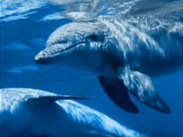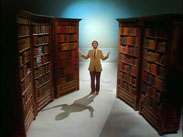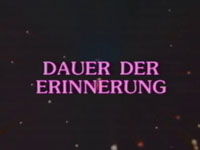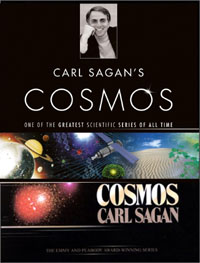|
But if we can't crack the communications barrier with whales and dolphins,
which evolved here with us on our planet, what hope have we of communicating
with beings who evolved elsewhere in our universe? What does our interaction
with whales say about us and our attitudes towards species who may be very, VERY
different from us? Very few astronomy documentary series give much time or thought
towards the question of the keen minds of our underwater brethren, so I have to give
"Cosmos" a lot of positive points for exploring the idea and its details with such
a rich and audio-visually rewarding sequence as we get early on in this episode.
Perhaps Sagan's frequent return to the idea of the digital bit is worth noting also.
This was a fairly new concept at the time, suddenly put to use to bring us photos from
probes exploring the outer planets, and sending large swaths of information all around
our own planet via satellite and fibre optic cables. It was the new standard unit
of computing, which offered so much fresh opportunity in science, business, and the arts.
But should all information in the universe be seen as conglomerations of
polarized, black-and-white choices? With many non-digital, or analogue, devices
making celebrated comebacks these days, it could be argued that there are such
aspects of information that don't easily fit into digitized representations
while still retaining their unique essence. Food for thought.
At any rate, "Cosmos" here utilizes its digital bit metaphor for a very useful purpose:
as a unit of measure which enables us to contrast increasing levels of intelligence
of various living beings, and by extension entire civilizations in concert. The scale
of this contrast is huge and awe-inspiring. We have the digital bit to thank for making
this clear intellectually, while visual effects, sets and props, music, and Sagan's
own story-telling ability drive the point home emotionally and unforgettably.
The sequences concerning brain structure and function and evolution are fascinating,
even if the information seems superfluous to anything any of us might want to do.
It's neat, but somehow feels surplus to requirements. Perhaps it is what is missing
that makes this section feel a bit malnutritious - Sagan's philosophy is that of the
materialist, and that all intelligence is a product of the physical brain. Too bad
there's no mention of the intelligent mind that might merely be using the brain
with all its stored DNA and learned information. Still, there is a lot of good stuff
here, not least of which is the highlight with which Sagan ends this section:
that we can each take self-responsibility for what we learn and how we choose to
act and grow and live. A supreme moment.
I do really like and appreciate the shift that occurs next, as we leave behind
the intelligence of individuals and examine instead the collective intelligence of
an entire society. Even the building and evolution of cities can be seen as an
expression of this phenomenon, as amply demonstrated by the abundant time-lapse photography
in this section, as well as Sagan's recounting of the history of New York city.
But it is in our invention of writing and books and libraries that the greatest repositories
of learned Human knowledge now reside, and Sagan spends most of the rest of the episode
appreciating and glorifying this aspect of our culture. Before it's all over,
we have advanced to the digital age of computers - and modern versions of "Cosmos"
introduce a welcome cheat by showing information on computer screens that are more advanced
than those of 1980, or even the usual 1990-1992 Cosmos Updates. One screen boasts info
of the 1994 reports of the Shoemaker-Levy 9 comet fragments. Cool.
The episode bows out by reminding us of the Voyager mission to the planets and beyond,
and giving a bit more detail of the information we decided to include on
the Golden Records designed for any space-faring extra-terrestrials who may one day
discover these probes. Sadly we only get a mere fraction of a taste of what is on
the disc... and on that point I'm going to give this episode a minus point, because
the piece of music chosen to continue over the end credits is a very unpleasant
and painful chunk of Human wailing that grates on my nerves, and I KNOW there are much better,
cooler examples of music from the Golden Record we could be enjoying instead. How about
"Faerie Round", or "El Cascabel", or even "Senegal Percussion"?
Great opportunities lost....
At any rate, this remains another of the good episodes of classic "Cosmos".
It is possibly the last of those 1980 episodes to be as pure in lasting quality,
as the remaining two episodes that follow each wade into different brands of controversy....
|
| Collectors' Edition 2000 (DVD) |
Original 1980 | |
| Composer/Performer | Title 2000 |
Composer/Performer | Title 1980 | Notes |
| Vangelis | Symphony to the Powers B, Movement Three
also known as "Theme from Cosmos" |
Title Music
0:00 - 0:46 |
| J.S. Bach | Partita No. 3 | 0:45 - 1:44 |
| Wm. Jeffery Boydstun |
full cue, scored to picture
|
Edgar Froese
K. Stockhausen
Toru Takemitsu
Isao Tomita
Tadao Sawai
Tangerine Dream
George Crumb
|
Maroubra Bay
Hymnen: Region II (end)
A10. Silk Road
Space Fantasy (organ effect)
Chisana Haru
Rubycon Part 1
Vox Balaenae 2 of 3:
Variation 5 of 5-Cenozoic &
Variation 3 of 5-Paleozoic | 2:37 - 8:39 |
humpback whales
(recorded by Frank Watlington) |
| "Solo Whale" (3 excerpts) | |
(on top of Evolution/Rubycon)
(by itself)
(on Tomita's Valkyries) |
|
6:57 - 7:29
9:29 - 10:11
10:50 - 11:15 |
| Richard Wagner / Isao Tomita | Space Fantasy - Ride of the Valkyries portion (synthesizer version) | 10:46 - 11:48 |
| Richard Wagner | Ring 2: Die Walküre - Ride of the Valkyries
(regular performance, scratched record?) | (Tomita's synthesizer Valkyries continue...) | 11:46 - 12:44 |
| Franz Liszt | Totentanz (section 2) | 12:53 - 13:10 |
humpback whales
(recorded by Frank Watlington) |
| "Solo Whale" (2 excerpts) | |
(by itself)
(by itself) |
|
13:54 - 14:37
16:23 - 16:44 |
| whales | various other bits of whale songs / underwater sounds
(played on top of other music) | ~4:50 - 18:14 |
| Claude Debussy / Isao Tomita | The Engulfed Cathedral |
George Crumb | Vox Balaenae 1 of 3:
Vocalise Pt. 2 of 3 | 17:06 - 17:30 |
| Nikolai Rimsky-Korsakov | The Tale of Tsar Saltan - Movement 2
"The Tsarina in a Barrel at Sea" | 17:29 - 18:15 |
| Vangelis | Himalaya | 18:12 - 18:30 |
| Johann Pachelbel | Canon in D (strings & orchestra) | Canon in D (brass version) | 18:26 - 19:55 |
| Vangelis | Himalaya | 19:53 - 20:38 |
| Alan Hovhaness | Symphony No. 4, Movement 1 | 20:55 - 21:42 |
| Vangelis |
| anaerobic glycolysis
22:05 - 22:53 |
| Johann Pachelbel | Canon in D (strings & orchestra) | 22:51 - 23:58 |
| Wm. Jeffery Boydstun | In Motion Delta 01 -> 02 (25:01 - 28:09) |
????
Steve Reich | drone sound
Music for 18 Musicians | 25:01...... |
| Vangelis | Himalaya (25:45 - 26:04, as sound effects over Motion Delta) |
Himalaya (longer section, by itself) | |
| Wm. Jeffery Boydstun | In Motion Delta 03 (28:13 - 28:38) |
Steve Reich | Music for 18 Musicians | ........ 28:38 |
| Johann Pachelbel | Canon in D | 28:36 - 29:00 |
| Vangelis | Himalaya | 29:00 - 30:55 |
| drone SFX (high) |
(boy's memory)
31:36 - 31:54 |
Felix Powell &
George "Asaf" Henry Powell |
Pack Up Your Troubles in Your Old Kit-Bag |
(boy's memory - radio song)
31:55 - 32:15 |
| Vangelis | Beaubourg - Side 1 - "Contemplations" (end - deeper drone sound) | 32:15 - 32:46 |
| Vangelis | Beaubourg - Side 1 - "SOL Prospects" (beginning) | 32:46 - 33:27 |
| Wm. Jeffery Boydstun | In Motion Delta 01 |
Steve Reich | Music for 18 Musicians (faint, while Beaubourg continues... | 33:25 - 34:08 |
| Vangelis | Himalaya | 34:41 - 35:09 |
| ?? Vangelis? | ??Comet Movement? - "À Voir La Lumière" |
William Russo | Three Pieces for Blues Band & Symphony Orchestra - Part 1 (Jive Turkey Blues) | 35:04 - 38:25 |
?? unknown
Ian Robert Hughes | ?? unknown piano music
Mortimer Street Rag (end) |
Scott Joplin /
arr. Grant Hossack | excerpts from
"The Ragtime Dance"
arr. as "The Family" on
"The Entertainer Ballet" album | 38:29 - 39:30
39:58 - 40:11 |
| Alan Hovhaness | Symphony No. 4, Movement 1 | 40:19 - 42:29 |
| Ludwig van Beethoven | Quartet No. 13 (Cavatina) | 42:30 - 43:57 |
| Alan Hovhaness | Spirit of Ink - Salutation of Dawn (flute trio) (....1980 = 2000) | 43:55 - 44:23 |
| Andrzej Panufnik | Sinfonia Sacra | (horn herald) |
| John Leach | Balinese Gamelan Ensemble |
K. Wasitodipuro /
Javanese
Court Gamelan | Gending: Mandalpati
"Strong Leader" | 44:48 - 45:15 |
| Traditional Chinese | Flowing Streams | 45:17 - 46:06 |
| Ludwig van Beethoven | Quartet No. 13 (Cavatina) | 46:06 - 47:39 |
| Erik Satie | Gymnopedie No. 3 (on flute, guitar, & harp) |
J.S. Bach | Prelude & Fugue No. 1
in C Major (on piano) | 47:50 - 48:52 |
Patrick Wilson &
Adam Routh | Cosmopolis: Stages #2 - Underscore
(electronic upbeat, to 51:14) |
William Russo
Toru Takemitsu
|
Three Pieces for Blues Band & Symphony Orchestra - Part 2
A7. Ten Wa Shirazu -
Daichi Wo | 48:47 - 50:32
50:30 - 52:14
|
| Wm. Jeffery Boydstun | In Motion Delta 01 |
Steve Reich | Music for 18 Musicians | 52:14 - 53:14 |
| Nikolai Rimsky-Korsakov | The Tale of Tsar Saltan - Movement 2
"The Tsarina in a Barrel at Sea" | 53:14 - 54:02 |
| Heldon | Perspective I
(under other cues) | |
| J.S. Bach | Partita No. 3 | 54:02 - 54:51 |
| Traditional | Bulgarian Shepherdess Song (vocal portions wailing away...) | 54:51... credits |
| Vangelis | Comet 16 | n/a | Collector's Edition 2000 Credits |










